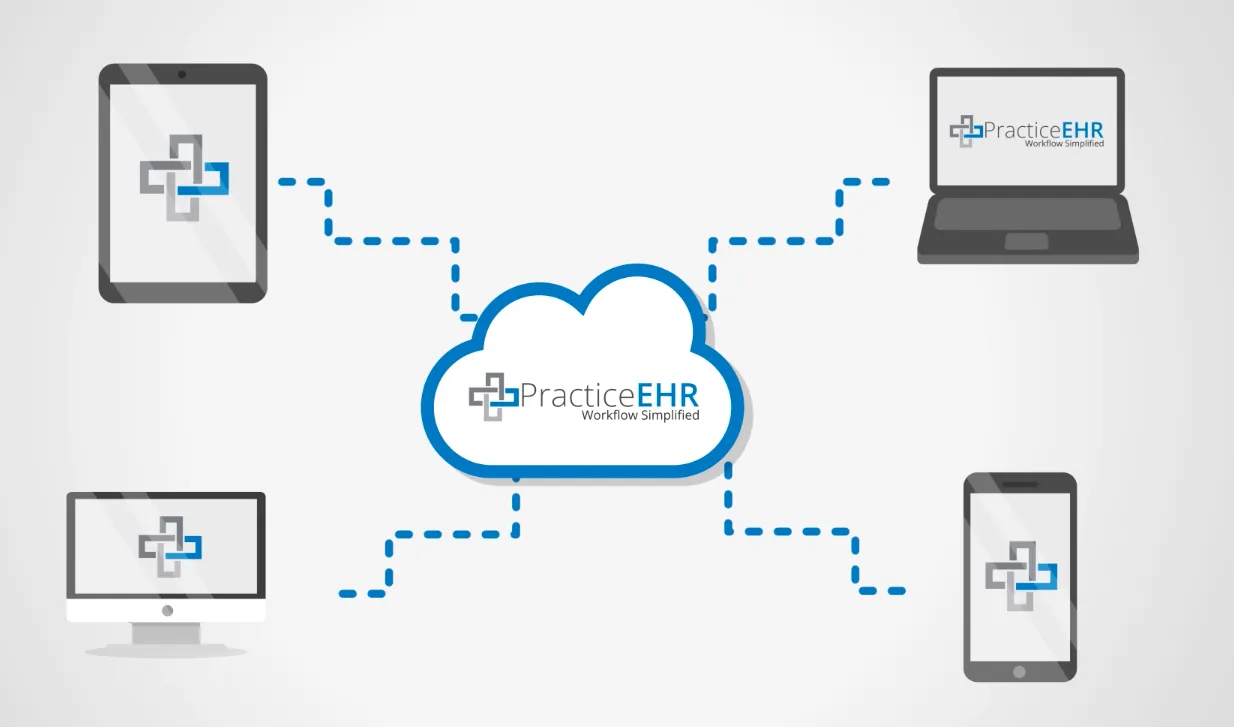Operating a family medicine practice is all about doing multiple tasks—from managing patient records to coordinating care for diverse families—at the same time. Just imagine a dedicated family health practitioner who...

Cloud-based EHRs are becoming a key requirement for medical practices looking for a new electronic health record (EHR) system. According to a Black Book survey, nearly 85 percent of physicians shopping for a new EHR required mobile access from their new system.
Why have cloud-based EHRs become increasingly popular? Many small to medium size medical practices who’ve transitioned to this type of software are realizing the benefits. Let’s look at three reasons web-based EHR systems are a great solution for physician practices.
Benefits of a Cloud-Based EHR
-
Cloud-based EHRs offer cost-savings and scalability.
Unlike costly server-based systems, cloud-based EHRs are centrally hosted and do not require any hardware installation, maintenance or software licensing, making them much more affordable and easily scalable for practice growth.
Cloud-based EHRs are offered as a software as a service (SaaS), meaning practices simply pay a monthly fee to use the software. Practices also don’t have the headache of worrying about updating the system, as updates are made automatically. Additionally, when a practice expands, new users, physicians or locations can easily be added.
-
Cloud-based EHRs result in better accesibility and patient care.
Cloud-based EHRs are a win-win scenario for physicians and patients. With cloud-based systems, physicians always have important information at their fingertips, allowing them to provide better, more efficient care to their patient. Imagine a scenario where a physician is out of office, but needs to follow up on an emergent case. With a web-based system, the physician could still log in to the EHR remotely and access the patient record as well as integrated clinical decision support. Having access to that pertinent information, at the right time makes it possible for the physician to provide better patient care.
Cloud-based systems also provide an opportunity for better patient interaction and engagement. Most cloud-based EHRs are accessible via an iPad, laptop or mobile device, meaning physicians are no longer tied down to a computer screen. Cloud-based systems allow for better mobility and patient interaction. For example, a physician can easily go from exam room to exam room with a handheld iPad and even engage the patient by showing them certain diagrams, charts or health information.
-
Cloud-based EHRs improve communication.
Cloud-based EHRs provide greater flexibility than ever before. With cloud-based systems, small practices have secure access to their EHR whenever they want, from whatever device they want, as long as there’s internet access. The ability to access the system remotely, whenever necessary, allows for better communication and collaboration between physicians, staff and patients. While patients won't have access to the EHR they do have 24/7 access to an online patient portal where they can send a secure message to the practice. Depending on the scenario, the practice can then log in to the EHR to follow up with the patient immediately or respond accordingly. The practice also has access to important patient information for scenarios that occur outside of office hours that will help them make more informed decisions for follow up procedures.
Cloud-based EHRs provide a lot of advantages for physician practices. Many who’ve already made the transition to a cloud-based EHR are experiencing the benefits. Is your practice ready to learn more about how a cloud-based EHR can benefit your practice? Let’s talk.
Topics: Integrated EHR, Patient Care, Small Practice, EHR Solution, digital age, Cloud-based EHR
RECENT POSTS



TOPICS
- EHR Solution (148)
- EHR (85)
- Patient Care (78)
- digital age (78)
- Medical Billing (73)
- Specialty-Specific EHR (71)
- Integrated EHR (59)
- Small Practice (56)
- Technology in Healthcare (56)
- Industry Update (51)
- New Technology (47)
- Medical billing services (46)
- EHR Features (43)
- RCM (43)
- Cloud-based EHR (39)
- Practice EHR News (39)
- Healthcare Office Management (37)
- Kiosk (28)
- HIPAA Security (21)
- ePrescribing (21)
- Telemedicine (15)
- EMR (12)
- Revenue Cycle Management (12)
- Practice Management Software (11)
- Client Favorites (10)
- Practice Automation (10)
- The ONE (10)
- Urgent Care (8)
- MACRA/MIPS (7)
- Patient Portal (7)
- Switching to New EHR (6)
- events (6)
- E-Prescribing (5)
- Product Updates (5)
- TeleVisit (5)
- AI Solutions (4)
- Insider (4)
- Internal Medicine EHR (4)
- MIPS (4)
- Podiatry (4)
- Podiatry EHR (4)
- AI Scribing (3)
- HIPAA (3)
- MIPS Reporting (3)
- Regulatory Updates (3)
- AI scanning (2)
- Billing for Private Practices (2)
- Clearinghouse (2)
- Dermatology EHR (2)
- EHR Scheduling (2)
- Family Medicine EHR (2)
- Foot and Ankle Care (2)
- Foot and Ankle EHR (2)
- Health records 101 (2)
- Integrated Practice Management (2)
- Medical Credentialing (2)
- Medical Practice Management Software (2)
- Orthopedics EHR (2)
- Patient Check-in Kiosk (2)
- Psychiatry EHR (2)
- Quality of Patient Care (2)
- Reporting Under MIPS (2)
- Risk and Liability in Medical Settings (2)
- Telehealth Platform (2)
- Telehealth Platforms (2)
- What Works Clearinghouse (2)
- AI-powered Medical Billing (1)
- Bariatric EHR (1)
- Behavioral Health Practices (1)
- Billing Communication (1)
- Cardiology EHR (1)
- Cash Flow (1)
- Chiropractic EHR (1)
- Data Security (1)
- Dos and Don'ts (1)
- EHR Guides (1)
- EHR KPIs (1)
- EHR Questions to Ask (1)
- EHR for Chiropractors (1)
- EHR for Chronic Illness (1)
- EMR vs EHR Difference (1)
- ENT EHR (1)
- Eligibility Verification in Medical Billing (1)
- Endocrinology EHR (1)
- Family Medicine (1)
- Gastroenterology (1)
- Gastroenterology EHR (1)
- General Surgery EHR (1)
- Geriatrics EHR (1)
- Guides (1)
- Healthcare Compliance Certification (1)
- Healthcare Practice Office Management (1)
- Help Center Videos (1)
- Insurance Reimbursement (1)
- KPI (1)
- Key Performance Indicators (1)
- Lab Processing (1)
- MACRA (1)
- Medical Billing Partner (1)
- Medical Coding Services (1)
- Mobile EHR (1)
- Nephrology EHR (1)
- Neurology EHR (1)
- Pain Management EHR (1)
- Pediatrics EHR (1)
- Physical Therapy EHR (1)
- Practice Cash Flow (1)
- PracticeEHR GO App (1)
- Pulmonology EHR (1)
- Simplify Practice Management (1)
- Staffing in Healthcare (1)
- Switch Medical Billing Providers (1)
- Urgent Care Medical Billing (1)
- Urology EHR (1)
- insurance claim denials (1)








